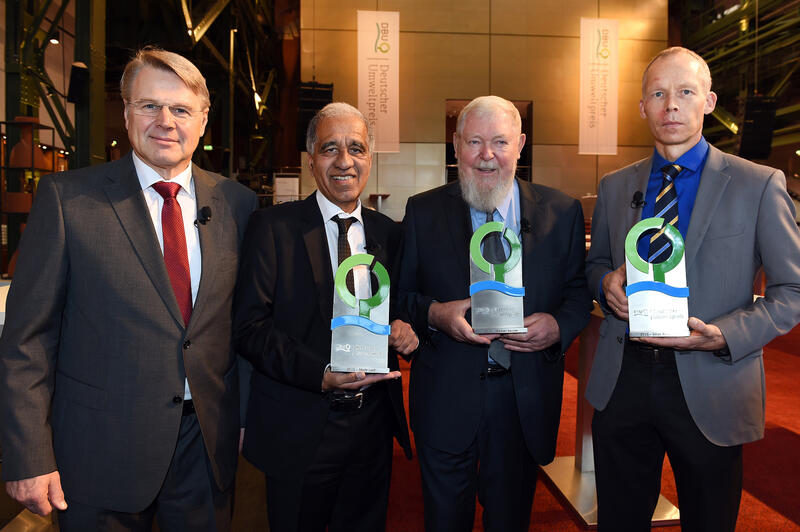German Environmental Award as a wake-up call to protect the world
The German Environmental Award of the Deutsche Bundesstiftung Umwelt (DBU) has been presented for the 23rd time. The climate and marine researcher Prof. Mojib Latif (61, Kiel) and the globally active sustainability scientist Prof. Johan Rockström (49, Stockholm) received what is the most lucrative European independent environmental prize in Essen today from the hands of German President Joachim Gauck and Rita Schwarzelühr-Sutter, the chair of the DBU Board of Trustees and Parliamentary State Secretary in the BMUB. By giving the award to these climate experts ahead of the United Nations Climate Change Conference beginning at the end of November, the DBU wants to address an appeal to the international community of nations to act resolutely to ensure the future of planet Earth. Latif and Rockström each received 245,000 euros. Em. Prof. Michael Succow (74, Greifswald) was honoured for his lifelong commitment to nature conservation with the Honorary Lifetime Achievement Award, worth 10,000 euros, which the DBU has presented only four times previously in addition to the main award.
Latif convinces experts and laypersons of the importance of intact oceans
The DBU honoured Latif as one of Germany's outstanding climate scientists. Among other things, it said, he warned that without intact oceans, the planet Earth was in danger of becoming uninhabitable for humans. The DBU described how Latif addressed experts and a broad target audience, including children and teenagers, in numerous books and technical articles. By so doing, he displayed his high scientific standards and his goal to write books whose content is more easily accessible to a wide public, according to the DBU.
Rockström provides important guiding data for politics, business and society
The DBU said Rockström had established biophysical boundaries for the planet within which a sustainable socio-ecological development remained possible. Together with well-known experts, he has collated and assessed globally available data on the state of the Earth and defined breaking points that could cause the planet to shift away from its current stable state, which is the one most desirable for humankind – just as, for example, international climate policy aims to limit global warming to less than two degrees Celsius compared with the level before industrialisation began. By so doing, he had created a concrete and important guiding framework for politics, business and society, the DBU said.
Centrepiece of east German nature conservation saved through Succow's commitment
The winner of the honorary award, Succow, was seen nationally and internationally as an exceptional figure in nature conservation, the DBU said. It described his commitment to large wilderness areas in Germany as unique. At the time of German reunification, Succow succeeded at one stroke in protecting almost 18 percent of the area of former East Germany under the national parks program. The DBU said that this centrepiece of east German nature conservation still remained an example for environmental protection and nature-friendly land usage in western Germany and the whole of Europe.
Latif: “If the climate were a bank, we would have rescued it long ago.”
In films shown during the ceremony, the prizewinners themselves once more clearly laid forth their approaches and attitudes. Latif underscored the importance of the oceans as “climate motors”. If oceanic currents changed, this also affected the climate, he said, adding that people's lives also depended on oceans being in good health, which was one reason they should not be misused as rubbish dumps and overfished as is the case now. Latif: “We must stop putting such a strain on the oceans.” He said emissions needed to be frozen at around today's levels globally and universally, and that the warning signals, which can already be noticed, must be taken seriously. Latif: “If the climate were a bank, we would have rescued it long ago!” Latif said that renewable energies were of central and dynamic importance, as they could have such rapid effects on climate development that climate negotiations at the political level would no longer be needed.
Rockström: “The question should never again be whether we begin protecting the climate, but only: how fast”
In his film, Rockström also stressed the vital importance of water for life. He said the way water was managed determined to a large extent whether there was hunger, poverty or even wars. Turning to the problem of global emissions of carbon dioxide, Rockström said that they had to be “radically reduced” within five to ten years at the outside. For this reason, he said, the upcoming UN climate conference was “probably the most important climate conference there has ever been. It is our best and last chance to achieve a secure future for the climate. The question should never again be whether we begin protecting the climate, but only: how fast.” His model of planetary boundaries, which brings together the topics of climate change, acidification of the oceans, the ozone hole and air pollution, was understood by people “because it does not impose limits on growth”, he said, adding that economic growth and development did not need to be cut to save the climate.
Succow: “Nature establishes the conditions for our civilisation”
In his film, Succow said people had to understand “that the nature that we do not use, that we don't destroy, is something fundamental. For this ecologically constructed house needs this undisturbed natural ecological balance. Nature establishes the conditions for our civilisation.” He criticised the tendency “to describe as progress things that are, in fact, destructive.” For this reason, he said, “conserving, being economical and taking time to reflect are things we can do in our lives without becoming unhappier.”

© DBU/Peter Himsel